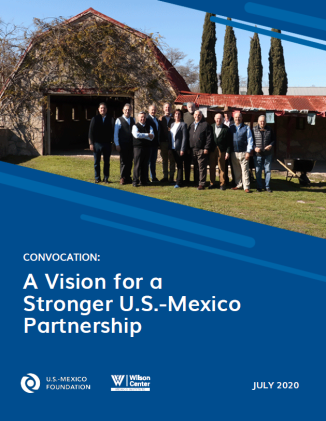Convocation: A Vision for a Stronger U.S.-Mexico Partnership


In January 2020, the U.S.-Mexico Foundation and the Wilson Center’s Mexico Institute brought together 6 former U.S. ambassadors to Mexico and 6 former Mexican ambassadors to the United States to discuss the bilateral relationship. The ambassadors engaged in an intensive and strategic dialogue concerning the future of U.S.-Mexico relations in critical areas, including economic competitiveness, public security, migration and borders. The participants also discussed the importance of cultural issues, public opinion and soft power to the bilateral relationship. Out of this Convocation, we produced a report, which outlines specific recommendations in each of the three traditional pillars of U.S.-Mexico relations: trade and competitiveness; security and the rule of law; and migration.
The discussions generated the following key findings and recommendations for the future of U.S.-Mexico relations:
- Strong institutions support stability and progress in the U.S.-Mexico relationship by maintaining the focus of high-level officials and helping to build cross-border relationships. Officials should restart the bilateral economic dialogue and potentially expand it to include issues of security and migration. A bilateral cabinet meeting could serve as an opportunity to initiate a new period of cross-border collaboration.
- At both national and local levels, the United States and Mexico must work to sustain public support for positive bilateral relations. People-to-people connections, especially through student and research exchanges, are critical to fostering mutual interest and understanding among U.S. and Mexican citizens.
- The United States and Mexico should develop a bilateral, coordinated economic strategy that is forward looking. This economic agenda must extend beyond trade issues to include inclusive regional growth, workforce development, and infrastructure investment to facilitate trade and travel.
- The United States and Mexico should establish a framework for a modernized security and intelligence-sharing relationship between the two countries that emphasizes shared responsibility in confronting transnational security and rule of law challenges. A comprehensive and dynamic strategy is needed to build institutional capacity and direct it quickly to developing issues, such as fentanyl trafficking.
- The two countries should work together at the federal and subnational levels on issues of border management. Innovative programs, such as joint inspection of cargo by U.S. and Mexican officials, can simultaneously improve border security and efficiency.
- The dynamics of regional migration have changed dramatically over the past decade, with Central Americans and recently extra-continental migrants growing in importance. The United States and Mexico should develop a bilateral migration framework that, to the extent possible, takes migration out of the political realm and makes it an issue of technical management. It should facilitate legal migration and modernize border management while prioritizing the humane treatment of migrants and refugees.

Wilson Center/U.S.-Mexico Foundation
Related Program

Mexico Institute
The Mexico Institute seeks to improve understanding, communication, and cooperation between Mexico and the United States by promoting original research, encouraging public discussion, and proposing policy options for enhancing the bilateral relationship. A binational Advisory Board, chaired by Luis Téllez and Earl Anthony Wayne, oversees the work of the Mexico Institute. Read more












